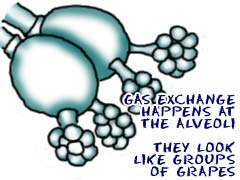7.- RESPIRATORY SYSTEM
RESPIRATORY SYSTEM - ALL ABOUT BREATHING
 Your respiratory system is all about exchanging gases with the environment. Some animals such as amphibians are able to exchange gases through their moist skin. Fish have gills while mammals, birds, and reptiles have lungs. Your respiratory system is made of your nose and mouth, a tube called the pharynx, another tube called the trachea, and your lungs. You have two lungs and the exchange of gases between the circulatory and respiratory systems happens in the lungs.
Your respiratory system is all about exchanging gases with the environment. Some animals such as amphibians are able to exchange gases through their moist skin. Fish have gills while mammals, birds, and reptiles have lungs. Your respiratory system is made of your nose and mouth, a tube called the pharynx, another tube called the trachea, and your lungs. You have two lungs and the exchange of gases between the circulatory and respiratory systems happens in the lungs.
WHAT DOES THIS SYSTEM DO?
Animals need oxygen (O) to survive. In fact, all organisms need oxygen to complete the process to burning glucose for fuel. Even protists and plants need oxygen, but as you become more active, you need a lot of oxygen. That’s where your respiratory system comes in.
It’s purpose is to bring oxygen into your body. One of the products of cellular respiration is carbon dioxide. Your respiratory system also helps your body get rid of that carbon dioxide. While you have lungs, fish have gills that serve as the location for that transfer of gases. Whatever animal you study, oxygen is taken in and carbon dioxide let out.
INTERACTING WITH OTHER SYSTEMS
 We already mentioned the circulatory system. With gases like oxygen and carbon dioxide (CO2), other compounds can be brought into the body by the respiratory system. Smoke can clog the alveoli in your lungs. You can inhale viruses and bacteria that could get you sick. You can also take in larger chemical compounds that can poison your body. All of these compounds can enter your blood stream via your respiratory system.
We already mentioned the circulatory system. With gases like oxygen and carbon dioxide (CO2), other compounds can be brought into the body by the respiratory system. Smoke can clog the alveoli in your lungs. You can inhale viruses and bacteria that could get you sick. You can also take in larger chemical compounds that can poison your body. All of these compounds can enter your blood stream via your respiratory system.
Although it does not happen in all animals, your respiratory system also interacts with your digestive system. Your mouth and pharynx are both used to swallow and to breathe. There is a branching point where you will find the epiglottis that directs food to your stomach and air to your lungs. Your respiratory system even connects with the nervous system in your nose where you smell.
PROBLEMS WITH RESPIRATION
 What can go wrong with your respiratory system? So many things can go wrong with this system. It is very vulnerable to both toxins and diseases. Some diseases such as pneumonia can cause your lungs to fill with fluid and you are no longer able to take in enough oxygen for your body.
What can go wrong with your respiratory system? So many things can go wrong with this system. It is very vulnerable to both toxins and diseases. Some diseases such as pneumonia can cause your lungs to fill with fluid and you are no longer able to take in enough oxygen for your body.
Smokers can have a build up of tar and clog the alveoli in the lungs and decrease the amount of oxygen your body can take in. An extreme disease called emphysema actually destroys the tissues in your lungs and the tissue can never be regenerated. Individuals that get emphysema are often forced to breathe pure oxygen to survive.
RESPIRATORY SYSTEM - ALL ABOUT BREATHING Your respiratory system is all about exchanging gases with the environment. Some animals such as amphibians are able to exchange gases through their moist skin. Fish have gills while mammals, birds, and reptiles have lungs. Your respiratory system is made of your nose and mouth, a tube called the pharynx, another tube called the trachea, and your lungs. You have two lungs and the exchange of gases between the circulatory and respiratory systems happens in the lungs. Your respiratory system is all about exchanging gases with the environment. Some animals such as amphibians are able to exchange gases through their moist skin. Fish have gills while mammals, birds, and reptiles have lungs. Your respiratory system is made of your nose and mouth, a tube called the pharynx, another tube called the trachea, and your lungs. You have two lungs and the exchange of gases between the circulatory and respiratory systems happens in the lungs. WHAT DOES THIS SYSTEM DO?Animals need oxygen (O) to survive. In fact, all organisms need oxygen to complete the process to burning glucose for fuel. Even protists and plants need oxygen, but as you become more active, you need a lot of oxygen. That’s where your respiratory system comes in.It’s purpose is to bring oxygen into your body. One of the products of cellular respiration is carbon dioxide. Your respiratory system also helps your body get rid of that carbon dioxide. While you have lungs, fish have gills that serve as the location for that transfer of gases. Whatever animal you study, oxygen is taken in and carbon dioxide let out. INTERACTING WITH OTHER SYSTEMS We already mentioned the circulatory system. With gases like oxygen and carbon dioxide (CO2), other compounds can be brought into the body by the respiratory system. Smoke can clog the alveoli in your lungs. You can inhale viruses and bacteria that could get you sick. You can also take in larger chemical compounds that can poison your body. All of these compounds can enter your blood stream via your respiratory system. We already mentioned the circulatory system. With gases like oxygen and carbon dioxide (CO2), other compounds can be brought into the body by the respiratory system. Smoke can clog the alveoli in your lungs. You can inhale viruses and bacteria that could get you sick. You can also take in larger chemical compounds that can poison your body. All of these compounds can enter your blood stream via your respiratory system. Although it does not happen in all animals, your respiratory system also interacts with your digestive system. Your mouth and pharynx are both used to swallow and to breathe. There is a branching point where you will find the epiglottis that directs food to your stomach and air to your lungs. Your respiratory system even connects with the nervous system in your nose where you smell. PROBLEMS WITH RESPIRATION What can go wrong with your respiratory system? So many things can go wrong with this system. It is very vulnerable to both toxins and diseases. Some diseases such as pneumonia can cause your lungs to fill with fluid and you are no longer able to take in enough oxygen for your body. What can go wrong with your respiratory system? So many things can go wrong with this system. It is very vulnerable to both toxins and diseases. Some diseases such as pneumonia can cause your lungs to fill with fluid and you are no longer able to take in enough oxygen for your body. Smokers can have a build up of tar and clog the alveoli in the lungs and decrease the amount of oxygen your body can take in. An extreme disease called emphysema actually destroys the tissues in your lungs and the tissue can never be regenerated. Individuals that get emphysema are often forced to breathe pure oxygen to survive.
|
 Custom Search * The custom search only looks at Rader’s sites.  // // |
1 comentario
christian louboutin shoes -